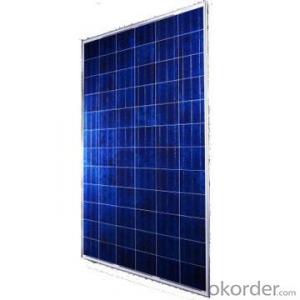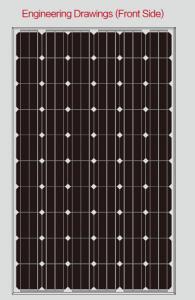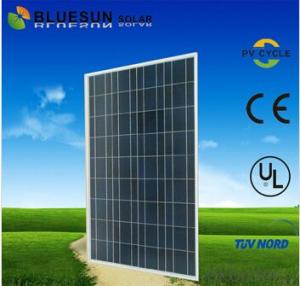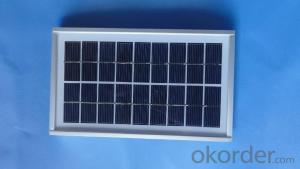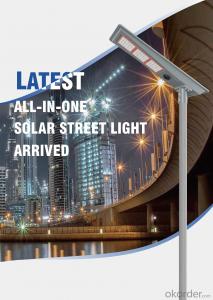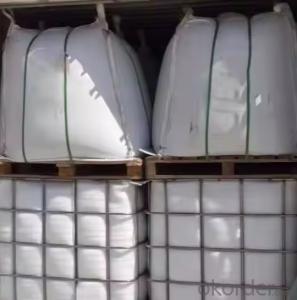180W Poly Solar Panel with High Efficiency Made in China
- Loading Port:
- Shanghai
- Payment Terms:
- TT OR LC
- Min Order Qty:
- 1000 watt
- Supply Capability:
- 1000000 watt/month
OKorder Service Pledge
OKorder Financial Service
You Might Also Like
Item specifice
Product Description
Solar module/panel with high efficiency solar cells
Strong, lightweight aluminum frame design with reinforced sealing and load hold to prevent freezing and warping, and stand against high wind.
Under Standard Test Conditions(STC): Irradiance of 1000W/m2, Am1.5 and 25º C cell temperature.
Mechanical Characteristics
Dimensions: 670mm(L) x 1460mm(W) x 40mm(H)
Weight: 14.5kg
Solar Cells: Polycrystalline solar cells, 36 cells
Construction: Front: High-transmission 3.2mm tempered glass; Encapsulate: EVA; Back: TPT
Frame: Clear anodized aluminum alloy Color: Silver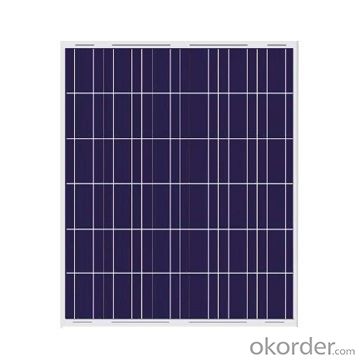 Product features:
Product features:
1. The modules use high-quality imported polycrystalline or monocrystalline solar cells;
Enclosed by high-rigidity tempered glass, with excellent light transmittance and output performance;
2. Surface treated with reflection-reducing process, increasing the light absorption.
Back sealed with anti-aging EVA, resistant from moisture and corrosion.
3. The efficiency of our monocrystalline solar cell is over 17%, and polycrystalline panel is over 16%. We stipulate, the allowance of each panel's rated power has to be positive. Each panel is strictly tested before leaving the factory.
4. Our solar panel is designed with a lifetime of 25 years, and guaranteed that the power decline less than 10% within 10 years, and 20% within 20 years.
| Performance | |
| Rated Power[Pmax] | 180W |
| Power Tolerance | ± 3% |
| Nominal Voltage | 37.08V |
| Design Life | 25 years |
| Electrical Characteristics | |
| Maximum Power [Pmax] | 180W ± 3% |
| Maximum Power Voltage [Vmp] | 37.08V± 3% |
| Maximum Power Current [Imp] | 4.86A± 3% |
| Short-Circuit Current [Isc] | 5.32A± 3% |
| Open-Circuit Voltage [Voc] | 44.28V± 3% |
| Current Temperature Coefficient | 0.08%/º C |
| Voltage Temperature Coefficient | - 0.32%/º C |
| Power Temperature Coefficient | -0.38%/º C |
- Q:I'm about to buy one but I don't really know which one is best for my home.
- One will give you enough DC voltage to light a 25 watt light bulb, [ one 45 watt panel is around $400. ] Now if your wanting AC voltage You have to buy a inverter, 5 or 6 deep cycle batteries, a switch Cables to transfer the voltage, a place out side to store the batteries, instalation brackets for the roof A Permit to Install them
- Q:Do solar panels require a battery backup system?
- No, solar panels do not require a battery backup system, but it can be beneficial to have one for storing excess energy for use during cloudy days or at night.
- Q:I have a panel that quot;deep breatheproduces at 4% efficiency, what can it power, It's about 4ft by 2ft
- I also doubt your claim of 4% efficiency. That strength solar panel is brand new technology (this year) and is not available in retail sizes yet. You probably got duped by some false marketing... In any case; even assuming you had a 4% solar panel, there are too many things for us to give you an accurate assessment of the power production. Clouds, location on earth, season, angle of the solar panel; these are all things we need to know to calculate it. Odds are it should have the average rate it produces electricity written on the back panel or with the instructions that came with it. I know of no solar panel retailers that do not also offer free installation. You should get your money back or get that free installation (and then you never have to worry about how much power it has, it just gets you what it can).
- Q:Is it really possible for me living in Denver to build and install and setup my own solar panel to help make electricity for my home?
- It's okorder / has something to say about various scams, including solar.
- Q:If a solar panel has a power rate of 80 Watts and efficiency of lets say 30%. Does that mean the maximum power this solar panel can generate is (30/00)*80=54 Watts or its just 80 Watts?
- If it says STC or Standard Test Conditions on the nameplate or documentation, then that means 80 watts under bright sun at an unrealistically cool temperature. It is rare to see that power in real life, except when the perfect storm of conditions come together. There is also a PTC rating for some panels, which is more realistic. If the panel does not say STC or PTC, the manufacturer is free to make up whatever test they feel like, which generally leads to ridiculously overstated power. As for efficiency, for residential panels, that's generally only of academic interest. A 80-watt panel is 80 watts, regardless of the efficiency. A more efficient panel will take up slightly less space, but most people are more interested in the total price, since roof space is generally not an issue.
- Q:how fast does a 25watt solar panel generate power to a battery? trying to figure out a conversion factor here to get a rough estimate of how many i would need to power my house, please help?
- To figure our how many you need, take a look at your power bill. It will tell you how many kilowatt/hours you used during the month. My bill says I use about 2000 kilowatt/hours per month, or about 2000 kwh /30 days=67 kw/h hours per day. That is 67,000 watt hours. To supply that with solar panels, you have to generate at least 67,000 watt hours, but you don't have a full day to do it, since you have to do it while the sun is up. So you put the energy into batteries during the day, so you can use it at night. A 25 watt panel generates about 25 watts when fully illuminated by the sun. If you fully illuminate it for an hour, you get 25 watt hours. If you get 2 hours of sunlight a day, that would seem to imply that I need 67000 watt hours/25 watts /2 hours=45 panels. But for most of the day, the sun isn't hitting the panel fully, so it isn't going to generate the full 25 watts. When the sun is 45 degrees to the side, you only get about 70%. When the sun is 60 deg to the side, you only get 50%. And what do you do on cloudy days? And the shorter days in the winter? To make up for this, you have to increase the number of panels to make up for the loss. So in reality, I might need double this number of panels, for realiable solar power throughout the year. That works out to about 90 panels, or ,250 watts worth for my house.
- Q:Can solar panels be installed on military installations?
- Yes, solar panels can be installed on military installations. In fact, many military installations around the world have already embraced solar energy as a sustainable and cost-effective solution for meeting their power needs. Solar panels help reduce reliance on traditional energy sources, provide a more secure and resilient energy infrastructure, and contribute to the overall goal of creating a greener and more sustainable military.
- Q:Tell me complete installation I have one 50Ah battery two 80 watts solar panels about 30 meter DC wire i charge ontroller and 000watt inverter. How i hook two solar panels to charge controller to battery then inverter?
- Wires from panels go to controller input terminals. Controller DC battery terminals to battery so that the controller will protect batteries and split power as required by demand to the inverter. Output DC on controller to inverter. Output AC or outlets on the inverter to AC appliances. One thousand watts is not very much capacity. It will keep your computer running and a lamp to read by. It won't run major appliances. A hair dryer is typically 500 watts and could not be run by this system.
- Q:Can solar panels work in cloudy weather?
- Yes, solar panels can still generate electricity even in cloudy weather. While direct sunlight produces the most optimal conditions for solar panel efficiency, they can still function and generate power in cloudy weather due to their ability to convert diffused sunlight into electricity. However, the electricity output may be lower compared to sunny days.
- Q:Can solar panels be installed on a school or university campus?
- Yes, solar panels can be installed on a school or university campus. Many educational institutions are recognizing the benefits of solar energy and are choosing to install solar panels on their campuses. This not only helps in reducing carbon emissions and dependence on fossil fuels but also serves as an educational tool for students to learn about renewable energy. Additionally, installing solar panels can lead to cost savings on electricity bills for the institution in the long run.
1. Manufacturer Overview |
|
|---|---|
| Location | |
| Year Established | |
| Annual Output Value | |
| Main Markets | |
| Company Certifications | |
2. Manufacturer Certificates |
|
|---|---|
| a) Certification Name | |
| Range | |
| Reference | |
| Validity Period | |
3. Manufacturer Capability |
|
|---|---|
| a)Trade Capacity | |
| Nearest Port | |
| Export Percentage | |
| No.of Employees in Trade Department | |
| Language Spoken: | |
| b)Factory Information | |
| Factory Size: | |
| No. of Production Lines | |
| Contract Manufacturing | |
| Product Price Range | |
Send your message to us
180W Poly Solar Panel with High Efficiency Made in China
- Loading Port:
- Shanghai
- Payment Terms:
- TT OR LC
- Min Order Qty:
- 1000 watt
- Supply Capability:
- 1000000 watt/month
OKorder Service Pledge
OKorder Financial Service
Similar products
New products
Hot products
Related keywords
